#chemical pesticides in rice farming
Explore tagged Tumblr posts
Text
Study reveals invasive Apple Snail could spread further in Africa
New research led by CABI and including the Kenya Plant Health Inspectorate Service (KEPHIS) reveals that the invasive Apple Snail – which threatens rice crops – could spread further in Africa. A team of researchers from CABI’s regional centre for Africa in Nairobi, working with KEPHIS, suggest that South West along Tana River, Western Kenya and areas coastal areas are suitable for Apple Snail…
#African rice production#alternate wetting and drying#Apple Snail invasion#Apple Snail management#CABI research#chemical pesticides in rice farming#climate change and pests#coastal Kenya farming#crop yield loss#early warning systems for pests#economic impact of Apple Snail#food security in Kenya.#invasive species#Kenya rice farming#kephis#Madagascar agriculture#Malawi rice farmers#mechanical control of snails#Mozambique rice pests#Mwea irrigation scheme#National Irrigation Authority#pest control in Africa#quarantine measures#rice crop protection#rice pests#rice value chain stakeholders.#sustainable rice farming#Tana River rice farming#Tanzania agriculture#Uganda rice production
0 notes
Text
KaruveppilaiRice Mix– Natural Products - MyTapas
Enjoy the wholesome goodness of Karuveppilai Rice Mix from Mytapas, made with nutrient-rich curry leaves and aromatic spices. A healthy, flavorful twist to your meals! Order: [email protected]!
#My Tapas#Organic#Natural#Pesticide-free#Eco-friendly#Organic products#Herbal products#Farm-to-table#Chemical-free#Bio-degradable#Health-conscious#Organic certification#Nutrient-dense#Organic Foods#Organic Spices#Organic pickles#Herbal Rice Mix.
0 notes
Text
Permaculture Methods
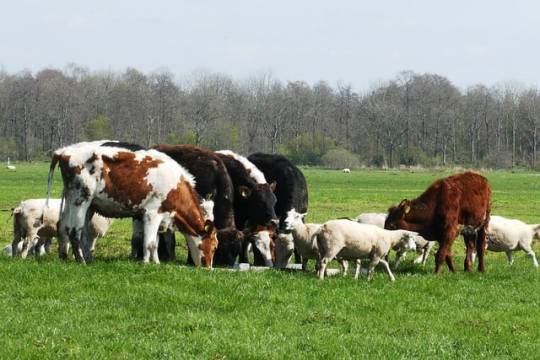
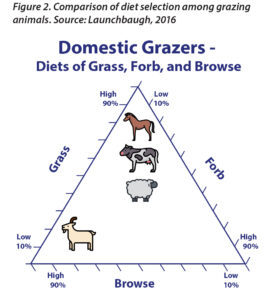
Mixed Grazing: grazing a flock of multiple species together in Pasture, such as cattle, sheep and goats. Each species has different dietary needs and are able to graze on different plants in the Pasture keeping weeds down and using acreage more efficiently. Cattle prefer grass, sheep prefer weeds, while goats like brush and forage. The animals also graze at different levels, cattle tall, sheep short, and goats climbing. A mixed flock is also healthier because each species has its own unique parasites that will not spread to members of a different species.
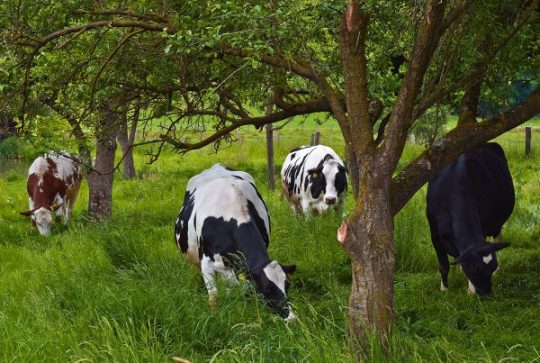
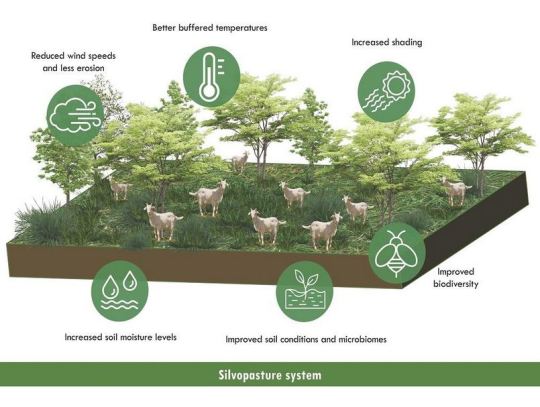
Silvopastoralism: grazing Livestock in Orchards and vineyards. The animals keep the grass and weeds down in the Orchards which helps keep the trees healthy. They fertilize the Orchards with their manure. Of course, as with most types of integrated farming it really helps save space for the smaller farmer or homesteaders.
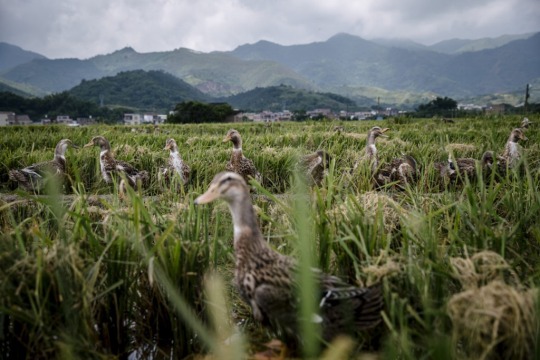
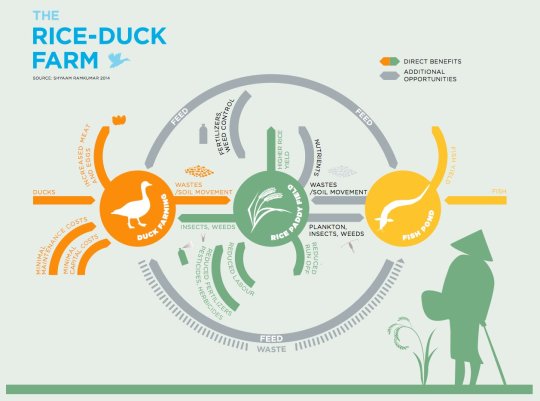
Integrated rice farming is done is Asia, using a variety of animals to help benefit the production of rice. The most common being rice-duck-fish farming, where fish are farming in channels around the rice field and ducks are released into the paddies. The fish and ducks fertilize the rice and keep pests at bay, especially mosquito larvae which can easily run rampant in a swampy rice field. The ducks and fish naturally replace the need for chemical fertilizers and pesticides.
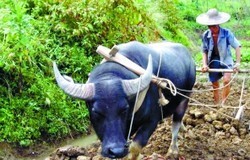
As a bonus: a lot of rice farmers use the water buffalo to plough the field, this animal is naturally at home in the swampy environment of the rice paddy. Aside from ploughing, the water buffalo is also used as a source of milk, meat and hide.
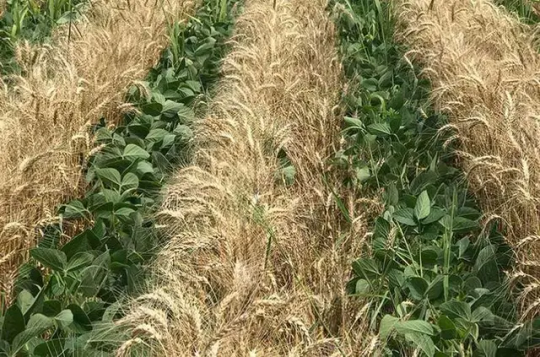

Intercropping/Companion Planting: planting different species of crops together that will have beneficial effects to each other. The most ancient intercropping is growing cereals and pulses (legumes) together, as the legumes provide lots of nitrogen that helps the grains grow. The Three Sisters is variation of this, combining maize (grain) with beans (legume) but also incorporating squash into the mix which help keeps weeds and pests like raccoons at bay with their sprawling prickly leaves. This system will work interchangeably with any grain, pulse or Marrow (the Marrows are squash, gourds, melons and Cucumbers).
Some other combinations we like to use are Root veg + Leafy green. We intercrop carrots with spinach (and beets with lettuce), the crops don't compete with another for space as one crop mainly grows up and the other grows down, the leafy greens also shade the root rows and help keep weeds down.
I think everyone's heard of the Tomato + Basil intercropping, and how the basil keeps tomato pests at bay and help flavour the tomatoes. We use this system with other nightshades (Eggplant and Peppers) as well, basil is a herb in the Mint family so we substitute basil for other herbs too (summer savory, marjoram).
18 notes
·
View notes
Text
“Dirty hands, clean money”
Organic farmers in Altamira are working to change the culture of a region where many people think nothing of using pesticides to kill weeds and insects. As well as the fight against entrenched attitudes, they face economic and climate challenges

Organic farmers in Altamira are working to change the culture of a region where many people think nothing of using pesticides to kill weeds and insects. As well as the fight against entrenched attitudes, they face economic and climate challenges
Sebastião Heraldo Lira Gomes has done a bit of everything, from soiling his hands in the yellow mud of Brazil’s gold-mining regions to digging in the black soil of a vegetable garden. In his 45 years, he has worked for construction and asphalting companies, at brick plants, and even as a gold prospector. In the mines, his life once hung by a thread when he was digging branches out of the mud to clean off material to be mined. An alarmed co-worker pointed to a mountain of tailings and shouted a warning: “The barrier is going to collapse.” It did, and Sebastião narrowly escaped. He told this story while planting a row of lettuce seedlings in his organic garden in Altamira, a city in southwestern Pará.
“Mining is an adventure. You head out not knowing whether you’ll come back,” Sebastião says. He survived the dangers but never returned to the mines. Born on a small farm on Bacabal, an island in the Xingu River, Sebastião grew up helping his family plant rice, beans, corn, and cassava. Until the age of 25, he followed in his parents’ footsteps, but then he moved to Altamira, where he held a number of jobs. In 2021, at the suggestion of his wife, Alderene, 51, he left mining and decided to make farming a source of income, hoping to enjoy the security of working on his own land while being close to his family.
When he contacted the Pará state rural extension agency Emater, the agent Joabe dos Santos asked him, “Why don’t you plant organic produce?” Sebastião didn’t even know what organic food was. His family had never used pesticides on their crops. Indigenous peoples, Beiradeiros, and other traditional communities in the Amazon have always planted without relying on these poisons.
Organic farming emerged as a response to the growing application of pesticides and fertilizers on European crops following World War I (1914-1918). The practice aims to keep agricultural activities in balance with Nature through the adoption of modern production techniques and the responsible use of water and soil. Organic farming rejects chemical fertilizers and transgenic seeds, which have been modified to resist drought, pests, and pesticides. This approach to agriculture also strives to forge an environment of social justice and respect for both human labor and the more-than-human world.
Continue reading.
#brazil#brazilian politics#politics#environmentalism#farming#image description in alt#mod nise da silveira
3 notes
·
View notes
Text
What Makes a Reliable Non-Basmati Rice Manufacturer?

Non-basmati rice is a staple food in many countries due to its affordable price, versatility, and varying grain sizes. From long-grain to short-grain varieties, it serves as the backbone of countless meals. But what’s the difference between an ordinary supplier and a reliable manufacturer when it comes to non-basmati rice? For wholesalers, retailers, and even consumers, choosing the right rice manufacturer can make a huge difference in quality, consistency, and long-term relationships. This blog will explore the key factors that ensure you’re sourcing from a trustworthy non-basmati rice manufacturer.
Quality Control Practices and Certifications
The foundation of any reliable rice manufacturer is its commitment to quality. Manufacturers with strict quality control processes ensure that each batch of rice meets specific standards for purity, grain length, moisture content, and taste. Look for manufacturers that adhere to international certifications such as ISO 9001 for quality management and HACCP (Hazard Analysis and Critical Control Points) for food safety. These certifications ensure that the rice is produced under clean conditions and undergoes rigorous testing to remove impurities.
Additionally, quality manufacturers often employ state-of-the-art testing laboratories that analyze rice for contaminants such as pesticides, aflatoxins, and heavy metals. This commitment to food safety ensures that you are getting a premium product that meets global standards.
Consistent Supply and Scalability
A reliable non-basmati rice manufacturer must be able to meet consistent demand, whether you are a small retailer or a large-scale distributor. This means maintaining adequate stock, having capacity for large orders, and increasing production as needed. Manufacturers with extensive farming networks or partnerships with multiple farmers can better guarantee stable supply throughout the year, regardless of seasonal fluctuations.
Scalability is especially important for businesses looking to expand into new markets. A trustworthy manufacturer will have the flexibility to adjust production volumes to align with your growth, ensuring a smooth supply chain even during peak seasons.
Technological advancements in milling and packaging
Modern rice milling and packaging technology plays a key role in maintaining the quality and shelf life of non-basmati rice. Reliable manufacturers invest in advanced milling machinery that reduces broken grains and preserves the natural texture and flavor of rice. Look for manufacturers that use automated sorting technologies to remove discolored or damaged grains, ensuring a more consistent product.
Packaging also matters. Vacuum-sealed or air-tight packaging helps preserve freshness and prevent moisture ingress, which can lead to spoilage or insect infestation. Manufacturers that adopt innovative packaging solutions help ensure that their rice reaches consumers in optimal condition.
Sustainable and ethical sourcing
As consumers and businesses are becoming more aware of sustainability, it is important to work with a manufacturer that values ethical sourcing. Reliable manufacturers prioritize environmentally friendly farming practices, such as minimizing the use of chemical pesticides and adopting water conservation methods. Some manufacturers also support small-scale farmers by offering fair trade agreements, ensuring that local communities benefit from their involvement.
Sustainably sourced rice also tends to be higher in quality, as the plants are grown in healthy soil, without an excessive reliance on synthetic chemicals. Look for manufacturers that openly share their sustainability initiatives or hold certifications such as Fairtrade or Organic to further validate their commitment to ethical practices.
Customer Support and Global Reach
Strong customer support is the hallmark of any reliable non-basmati rice manufacturer. A good manufacturer should provide clear communication channels, timely responses to inquiries, and efficient problem-solving when issues arise. This level of support fosters trust and ensures a seamless business relationship over time.
Additionally, manufacturers with a global reach and experience exporting rice to multiple countries are better equipped to handle the complexities of international shipping, customs regulations, and regional preferences. A manufacturer with a proven export track record can provide invaluable guidance, especially for businesses looking to expand internationally.
Choosing the right non-basmati rice manufacturer isn’t just about considering price. Quality control, supply continuity, technological advancements, consistency and customer support all play a vital role in ensuring you get a great product. By partnering with a reliable manufacturer, you can guarantee that your business will thrive and your customers will be happy.
2 notes
·
View notes
Text
Can Aquaculture Be Sustainable for Our Environment with the Right Approach?

Aquaculture--the method of farming saltwater and freshwater fish, shellfish, and aquatic plants--has become a reliable system over the past few decades for alleviating the world food demand, providing fish for consumption without overfishing, allowing economic relief for fishermen, rebuilding endangered species, etc. This practice has been widely used to better maintain the declining ocean fish population by creating farming approaches such as open-net pens, pond systems, closed systems, raceways, recirculation systems, suspended aquaculture, submersible net pens, etc. Additionally, aquaculture has relieved some fishermen's economic strain by providing coastal community jobs and lessening the need to overfish.
However, the many types of farms can vary with their risk to the environment and how controlled the areas are. Many farms can damage the outside waters because of potential contaminants in contact with specific systems. In contrast, some farms have less invasive methods and can be more sustainable with suitable regulations and ongoing improvements.
Various Farming Methods

Photo: Kelly Roebuck, open-net pen in BC
Open-net pens (cages) are placed directly into the water and moored at the bottom surface of the ocean, usually containing saltwater fish such as Atlantic salmon, trout, bluefin tuna, etc. They allow for contact between the farm and the outside environment, which risks the leakage of waste and chemicals, transfer of diseases, and escaping fish from damage to the cages. This threatens wild juvenile fish that may be interbred with farmed fish, which may transmit disease and alter the local gene pool. Not only that but without any regulation of pesticides and waste, the water that flows freely through the ocean and into the cages is not a controlled factor.
Watershed Watch Salmon Society Senior Scientist Stan Proboszcz reveals, "The fact of the matter is that many migrating fish have no choice but to pass by these farms.” This indicates the unavoidable encounter between farmed fish and wild fish in an open system.
Closed containment systems "use a barrier to control the exchange between farms and the natural environment." Some closed systems include ponds, tanks, recirculation technology, or raceways to limit the interaction with the outside habitat and are primarily used for freshwater species such as abalone, tilapia, and shrimp.
Pond culture is a popular method used in coastal Asian countries, with the area where fish reside contained in a small enclosed space in the ground. Species are raised, and feed is added to maintain their diet. Wastewater containing nitrogen and phosphorus used as fertilization for phytoplankton growth as a natural food base and other components such as bacteria, algae, and chemicals should be adequately filtered when discharged to be environmentally noninvasive. When unfiltered, it can lead to groundwater pollution in the outside environment.
Mangrove forests on the coast of Asian countries have been depleted because of alterations made to accommodate these fish and shrimp farms. The World Resources Institute evaluates that “nearly half the land now used for shrimp ponds in Thailand was formerly used for rice paddies; in addition, water diversion for shrimp ponds has lowered groundwater levels noticeably in some coastal areas.” This issue demonstrates the damaging effect of the need to create more shrimp ponds at the cost of natural mangrove ecosystems, salinization of soil and water, discharge of effluents resulting in pollution of the pond system and receiving waters, and misuse of chemicals. To combat this issue, the restoration and protection of mangrove habitats should be managed along with regulations regarding pond effluents, chemical use, and regional cooperation.
Recirculation technology cycles water through filtration processes and returns it to the aquaculture system. This process aids in maintaining water quality in natural waterways by minimalizing the potential for fish escapes, disease transmission, and pollution.
A semi-closed system exchanges the wastewater used in ponds for fresh natural water from outside sources. This method does not treat the water like recirculation technology but instead pumps out unfiltered water into the environment, which only increases pollution and damage to other fish.
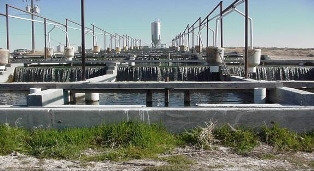
Photo: Gary Fornshell, University of Idaho, flow-through tilapia farm near Boise, Idaho
Raceways are relatively straight, narrow, shallow tanks that need high water flow to sustain the aquatic life, usually rainbow trout, catfish, or salmon, raised there. They require large amounts of flowing water diverted from natural streams, streams, or wells to provide a high-quality water source. The main issue with raceways is the high release of effluents from fish fecal matter and uneaten feed, which flows into the receiving body of water.

Photo: Santryl, PEI oyster farm CC BY-NC 2.0
Suspended aquaculture uses cages, nets, or mesh bags with a rope to attach and drop shellfish such as oysters, scallops, mussels, or clams into a body of water. This method of vertically suspending shellfish only requires clean water and steady water flow to decrease the potential waste buildup. If the species is native to the environment as well, it can be a low-risk form of fish farming, and shellfish can naturally filter feed, allowing them to help restore waterways.
Although there are more aquaculture methods, the methods described above are the most popular ones that can cause low-risk or high-risk environmental damage. Some potential risks to the natural habitat that some farms pose have created a worry for environmentalists who believe that these intensive methods prioritize the output of fish while minimizing the input of resources to grow while harming the fish's lifestyle and environment economically. If fishing farms implement new and innovative solutions while continuing the minimally invasive methods, the future of aquaculture could be beneficial in further creating food security without causing irreparable damage.
Solutions
Some solutions to decrease the environmental impacts of aquaculture reside on multiple factors. In general, careful planning of the location, shipping, and aquaculture method by fisheries could lessen the impact. However, more specifically, to combat the issue of mangrove forest depletion, the restoration and protection of mangrove habitats should be managed along with regulations regarding pond effluents, chemical use, and regional cooperation. In other cases, research should be done to minimize waste matter in water before pumping it out into other water sources in recirculating methods. With the same thought in mind, new research should apply to different systems of cleaning wastewater instead of allowing it to contaminate surrounding areas. This way, methods directly contacting the ground or natural water sources can be more sustainable with their waste outputs. Another idea scientists have discussed is using an integrated cultivation system where fish such as finfish, oysters, sea cucumbers, and kelp are farmed together to take less space and have shellfish species that can clean the surrounding environment that has built up waste. Not only will this minimize space, but also help the effluents discharged.
The Ocean Foundation has composed an article discussing the effects of aquaculture along with some research scientists have done, as well as possible solutions. Their efforts and others, such as the National Oceanic and Atmospheric Administration, have created findings that will lessen the harmful effects of aquaculture, hoping for sustainable ways to provide food security and alleviate poverty.
Sources
youtube
#climate change#climate justice#earth#environment#environmentalism#epa#environmetalists#aquaculture#Youtube#fish
2 notes
·
View notes
Text
I love carbs too, and so does like everyone in the tags, the better way to voice it is “the amount of processing, chemicals, pesticides, insecticides, and other big farm practices has purposely made carbs and rice a more harmful and less nutritious product that is purposely processed to be less filling so you can go and buy more food, instead of being filled and of enjoying the life bread and carbs have given.”
The grains are not evil, the way we have harvested, exploited, and used grains are. Look at vegetables as an example:
In 1900, there were nearly 550 varieties of cabbage available in the United States; today only 28 varieties are sold commercially. With beets, the change is from 288 to 17. For cauliflower, from more than 150 to only 9. And corn? I hate to tell you? But we have lost over 96 precent of the corn varieties available at the start of the twentieth century.
—“Dirt to Soil” Gabe Brown
The problem is that the “health nut” and diet industry are trying to curb the side effects of this type of agriculture, not stop it— for the symptoms are wonderful profits. We are at a point where an American needs to eat a multivitamin a day to be healthy—which opens a new market to make profits. You will need to eat 10 of todays apples to get the nutritional value of 1 apple from the 1900s.
Look, I love grain and rice like the next human, but we are being victims of an industrial practice that cares more about the money we spend for food rather than the quality and health we get from the food, and it is destroying us and the only solution some have found is to stop eating bread but it does not curb the industrial practices—it’s like someone stop using plastic straws doesn’t stop all the plastic straws that are still being produced.
I’ll end on this note—because I can talk about this forever—Wendell Berry has noted in his book “The Unsettling of America” that in the 1970’s that many of the leaders of policy started seeing “Food is a weapon” and a weapon that can be industrialized for not only our survival but for our power, “Agripower” and “agridollar” specifically. But what it has been done instead is make a family and community run farms into factories with food as the weapon— this is why I think the United States voted no at the UN that food is a right, it is just another private industry that is “empowering us” and should not be shared, while depriving us of much. Thus, this is the world of food that capitalism has built for us to starve in.
‘bread is bad for you’ ‘rice is bad for you’ sorry im not subscribing to the idea that staple grains that have been integral to cultures for centuries are evil. i love you carbs
129K notes
·
View notes
Text

Protect Your Crops from Pests: A Farmer’s Guide
Pests can wreak havoc on your fields, reducing yields and harming your hard work. But with the right knowledge, you can safeguard your crops and secure a better harvest. Here's a detailed guide to help Indian farmers identify and treat common pests in small plants and tree crops effectively.
🐛 Common Pests in Small Plants and Crops Small crops like rice, wheat, vegetables, and pulses often face pest attacks that reduce their productivity. Here's what you need to know:
1️⃣ Aphids
What They Do: Sap-sucking insects that weaken plants, curl leaves, and transmit diseases. Affected Crops: Vegetables, pulses, and leafy greens. Solution: Spray neem oil (5 ml/liter of water) weekly to control their spread.
2️⃣ Whiteflies
What They Do: Cause yellowing of leaves and viral infections. They leave sticky residue that attracts mold. Affected Crops: Cotton, vegetables, and fruit crops. Solution: Use sticky traps and garlic-chili sprays to repel them naturally.
3️⃣ Stem Borers
What They Do: Bore into stems, weakening plants and reducing yields. Affected Crops: Rice, maize, and sugarcane. Solution: Apply Chlorpyrifos for effective control.
4️⃣ Cutworms
What They Do: Sever plants at the base, particularly at night. Affected Crops: Tomato, cabbage, and leafy greens. Solution: Spread Bifenthrin granules around plants to prevent damage.
🌳 Common Pests in Tree Crops Tree crops like mango, guava, coconut, and citrus are valuable but often attacked by persistent pests.
1️⃣ Fruit Flies
What They Do: Lay eggs inside fruits, causing rotting and unmarketable produce. Affected Crops: Mango, guava, and citrus. Solution: Use pheromone traps and apply Malathion for control.
2️⃣ Mealybugs
What They Do: Suck sap and attract sooty mold, reducing tree health. Affected Crops: Mango, pomegranate, and guava. Solution: Spray biodegradable soap mixed with water or apply neem cake to the soil.
3️⃣ Scale Insects
What They Do: Attach to stems and leaves, weakening the tree. Affected Crops: Citrus, coconut, and cashew. Solution: Use Dimethoate spray and ensure proper pruning.
4️⃣ Bark-Eating Caterpillars
What They Do: Feed on bark, weakening the tree and reducing fruit yield. Affected Crops: Mango and cashew. Solution: Apply Chlorpyrifos around affected areas.
🌟 Integrated Pest Management (IPM) for Success Farmers, combine these strategies for the best results: ✅ Monitor Regularly: Look for early signs of pests to act before the infestation spreads. ✅ Natural Predators: Introduce ladybirds for aphids or parasitoid wasps for fruit flies. ✅ Crop Rotation: Break pest cycles by rotating crops each season. ✅ Judicious Pesticide Use: Use chemicals only as needed and follow recommended dosages.
💡 Tips for Farmers Use weather predictions to anticipate pest outbreaks. Maintain a clean field and orchard to reduce breeding grounds for pests. Educate farm workers on identifying and handling pest infestations. Keep detailed records of pest treatments for future reference.
🌿 Join the Movement for Better Farming At Vatshal Green, we are committed to helping Indian farmers protect their crops and boost yields. Let us guide you in making your farm pest-free and productive!
📞 Call us now for pest management advice and sustainable farming solutions! Learn More: https://bit.ly/41NCywq
#ProtectedCultivation#Greenhouse#ShadeNetHouse#Agriculture#Farming#Horticulture#CropProtection#GreenhouseFarming#FarmInnovation#SmartFarming#Hydroponics#SustainableAgriculture#EcoFriendlyFarming#FarmTechnology#CropYield#AgTech#GreenHouseSystems#VentilatedPolyhouse#ShadeNetting#FarmingSolutions#AgricultureTechnology#AgriBusiness#agriculturepests#pesticides#fertilizer
0 notes
Text

Breaking News Business, Economy, Multimedia, Web Development, Science, World
2025 Blessings to you and your loved ones.
[Warning: Dangerous tea with carcinogenic engine oils, brand name FITNE Herbal from the Netherlands, is being sold in Hellas.]
[210 shampoo, shower gel and cosmetics recalls in December – Containing dangerous chemicals, Schwarzkopf, Palmolive, Nivea, PANTENE, Just Cavalli, Avon, Jean Paul Gautier, Desigual, Roberto Cavalli, Clinique, Enrico Coveri, Chanel, Prada, Perlier, Rocco Barocco – Sergio Tacchini, Dove, BOROTALCO, Garnier, L’OREAL, Neutro derma. These are just some of the cosmetics listed as unsuitable for use]
DNews: Rice is being recalled due to increased arsenic and heavy metals, Camargue organic rice 1kg of the BONGRAN brand.
ProNews: Chaos in Parnassos-Arachova: Electric cars "froze" and caused "suffocation"
In: Tom Hardy offered to donate €300,000 to unpaid workers on his new series
[How dangerous are baby shrimp – Laboratory analysis, contaminated with mold toxins]
[Hydrogen cyanide in flour – Urgent recall – Praise brand cassava flour “Kokonte-Lafu” sold in 8 countries]
Yahoo: Google Says It Appears to Have Accessed Parallel Universes
[Over 25 tons of spoiled and illegal meat seized from a Hellenic company]
[Lidl SI: Alarm for two products contaminated with carcinogenic aflatoxins and salmonella!, Belbake]
ThePeople'sVoice: Starbucks Sued For Selling ‘Chemical Soup’ of Artificial Colors and Flavors Disguised as Food
[Dangerous pathogen in cat food – Owners are also at risk – Immediate withdrawal from three countries, MULTIFIT product “MF It’s me Scarlet Sensitive turkey.]
[Pesticide-tainted grapes – Immediate recall, brand “Sweet Globe” from supplier Everest Fresh Groenten En Fruit BV]
[Coca Cola: Recall of 28 million soft drinks due to serious risk – 80 inspectors in action]
[Class I Alert for Contaminated Eggs – Recall Expanded - Costco Due to Salmonella Fears, Kirkland Signature Brand, Handsome Brook Farms in New York]
[LN24: Nano tech found in Coca-Cola and Pepsi.]
[Lidl Nl: Urgent product recall, Kipster Smoked Sausage, Lidl still in business, unbelievable]
[The popular chocolate that was banned in Buckingham - Cadbury]
[Urgent recalls on Christmas favourites over safety fears - Tesco, Morrisons, Aldi, Dunnes.]
TheCryptoBasic: US Congress to Prioritize Crypto Regulation Next Year
DailyNewsEgypt: Zambia, Saudi Arabia sign debt restructuring deal
Reuters: India considers cutting personal income tax to lift consumption
[All Japanese banks use Ripple]
ToPontiki: Commission: Yellow card to Greece for 5 "holes" in the economy - Deficits, investments, real estate, debt, unemployment
[A lawsuit of 450 million euros against the state for loans in Swiss francs - Hellas.]
Dnews: Opened a "backdoor" for mass cancellations of taxes and fines (Hellas)
CanadaFreePress: “The CDC is now saying there have been enough cases of people who have had the vaccine, received the vaccine & then suffered a stroke”
[Vegan sausages in mineral oil, salt and iodine – Disappointing laboratory results]
NYPost: Over 10,000 pounds of pork products recalled due to ‘health hazard’
Holiday/New Year Sales
Enjoy the offers from the WMS network 🙂
Huge discounts, early-bird prices, amazing prizes, epic announcements, and hot deals from WebMarketSupport and its network.
Business-related, multimedia, and more.
Update Dec 29: Fresh deals for New Year’s season. My bonuses are valid throughout the duration of these deals.
WebMarketSupport News:
Business Storytelling: Don't Sell, Take People On a Journey. Latest article. Comprehensive analysis and a sneak peek into the innovative storytelling framework "7ID StoryX". The "Story Odyssey" experience unlocked (inside the member's area). Just signup with your email to get access to all the upcoming releases.
Knowledge Economy: Workshop #12 incoming
Look out for the freebie before the workshop (done)
Info product #1 Landing page development with the powerful 7ID StoryX (storytelling framework)
Stay tuned for more!
news #BusinessNews #EconomyNews
0 notes
Text
Agrochemicals Market
Agrochemicals Market Size, Share, Trends: Yara International Leads
Emerging Trend: Rising Adoption of Sustainable and Bio-based Agrochemical Solutions Transforms Market Landscape
Market Overview:
The global agrochemicals market is set for significant growth from 2024 to 2031, with the Asia-Pacific region at the forefront. The market is seeing rapid development in biological crop protection products and is undergoing substantial upheaval due to sustainable agriculture techniques and precision farming technologies. This transformation is driven by the increasing demand for sustainable and efficient agricultural practices, which are crucial for meeting the global food security challenges and supporting intensive farming methods.
DOWNLOAD FREE SAMPLE
Market Trends:
One major trend reshaping the global agrochemicals market is the rising adoption of sustainable and bio-based agrochemical solutions. This trend signifies a broader shift towards sustainable agriculture, with organic farming growing by 35% globally over the last two years. As a result, there has been a 42% increase in bio-based pesticide adoption. Major agricultural regions, particularly in Europe, have reported a 28% increase in sustainable agrochemical usage, highlighting the transformation driven by environmentally conscious farmers.
Market Segmentation:
The fertilizers segment continues to dominate the market, driven by an increasing focus on crop yields. Nitrogenous fertilizers hold the lion's share, with global usage climbing by 3.5% per year. Developing countries, particularly in Asia-Pacific, are experiencing the fastest growth rates. The transition to precision agriculture has resulted in a 35% rise in controlled-release fertilizer use. China and India have reported a 40% increase in fertilizer demand for rice cultivation. The industry is also witnessing substantial innovation, with smart fertilizers accounting for 15% of the premium market share.
Market Key Players:
The global agrochemicals market features several key players driving innovation and growth:
Yara International
SABIC
Royal Dutch Shell plc
OCP Group
PhosAgro
Rashtriya Chemical Fertilizer Ltd.
Contact Us:
Name: Hari Krishna
Email us: [email protected]
Website: https://aurorawaveintellects.com/
0 notes
Text
The Power of Organic Green Powder and Organic Green Protein Powder for Your Health
Introduction
In recent years, there has been a surge in popularity around plant-based nutrition, and for good reason. As more people turn toward natural, nutrient-dense foods to support their well-being, products like organic green powder and organic green protein powder have become essential additions to many individuals' diets. These supplements provide a range of health benefits and make it easier to consume the daily recommended servings of greens. If you're looking to boost your energy, improve digestion, and enhance overall health, incorporating organic greens powder organic into your routine might be just the change your body needs.
What is Organic Green Powder?
Organic green powder is a convenient supplement made from a blend of nutrient-rich, green plants like spinach, kale, spirulina, chlorella, barley grass, and wheatgrass. These greens are harvested from organic farms, ensuring that they are free from harmful pesticides, chemicals, and artificial fertilizers. This makes organic green powder a clean and pure source of vitamins, minerals, antioxidants, and fiber.
The beauty of organic greens powder lies in its ability to offer a wide spectrum of nutrients that support various bodily functions. Packed with chlorophyll, it helps to detoxify the body, support red blood cell production, and promote overall vitality. Additionally, greens powder is rich in vitamins A, C, and K, which are crucial for maintaining immune health, promoting healthy skin, and supporting bone strength.

Why Choose Organic Green Protein Powder?
While organic green powder is an excellent source of vitamins and minerals, organic green protein powder takes it a step further. This supplement combines the benefits of greens powder with a plant-based protein source, such as pea protein, rice protein, or hemp protein. For those who follow a plant-based diet or simply prefer to get their protein from non-animal sources, organic green protein powder is an ideal option to meet protein requirements while still benefiting from the nutrient density of greens.
Protein is essential for building and repairing tissues, supporting muscle growth, and maintaining a healthy metabolism. With the addition of organic green protein powder to your daily routine, you can easily supplement your protein intake without resorting to artificial protein powders or animal-based products. Whether you're an athlete looking to enhance muscle recovery or someone who wants to maintain a balanced diet, this plant-powered protein option is a game-changer.
Health Benefits of Organic Greens Powder
Supports Detoxification The chlorophyll content in organic greens powder helps detoxify the body by eliminating toxins, improving liver function, and promoting optimal digestion. As a natural detoxifier, it helps cleanse the digestive tract, making it easier for your body to absorb essential nutrients.
Boosts Energy Levels Feeling sluggish? Organic green powder provides a natural energy boost without the jitters associated with caffeine or energy drinks. The abundance of vitamins, minerals, and antioxidants in greens powder supports your metabolism and helps regulate your energy levels throughout the day.
Improves Digestion Greens powder is a rich source of fiber, which supports gut health and digestion. Fiber promotes healthy bowel movements, reduces bloating, and helps maintain a healthy weight by keeping you feeling full longer. When you incorporate organic greens powder into your diet, you're supporting a healthy digestive system and ensuring your body can efficiently process nutrients.
Strengthens Immunity Organic green powder is rich in vitamins C and A, both of which play a crucial role in supporting the immune system. Regular consumption of greens powder can help boost your body’s natural defense mechanisms, helping you fight off illnesses more effectively.
Enhances Skin Health Thanks to the high levels of antioxidants and essential nutrients found in organic greens powder, your skin will also benefit. The vitamins and minerals work to promote healthy, glowing skin, reducing the appearance of acne, wrinkles, and fine lines.
Why Organic Matters
When it comes to health supplements, the quality of the ingredients matters immensely. Organic green powder and organic green protein powder are derived from crops that are grown without the use of synthetic pesticides, fertilizers, or genetically modified organisms (GMOs). This means you’re getting a cleaner, more natural product that’s better for both your health and the environment.
Organic farming practices prioritize soil health, biodiversity, and sustainability, making organic green powders a more ethical and eco-friendly choice. By choosing organic greens powder organic, you’re not only investing in your health but also supporting sustainable farming practices that benefit the planet.
How to Incorporate Organic Greens Powder into Your Diet
Incorporating organic green powder into your diet is easy. You can mix a scoop of greens powder into smoothies, juices, or even water for a quick, nutritious boost. If you're using organic green protein powder, it can serve as an excellent post-workout drink or meal replacement when blended with your favorite fruits, nuts, or seeds.
For best results, make organic green powder a part of your daily routine. It’s an easy, effective way to give your body the nutrients it craves without the hassle of preparing multiple servings of vegetables each day.
Conclusion
Organic green powder and organic green protein powder are powerful additions to any diet. Packed with essential nutrients, these supplements can help improve energy, support digestion, and enhance overall health. By choosing organic options, you're ensuring that your body gets the purest, most sustainable form of nutrition. Whether you’re looking to detoxify, boost immunity, or supplement your protein intake, these organic superfoods offer a simple and effective way to prioritize your health. Start incorporating organic green powder into your daily routine and feel the difference it can make in your life.
0 notes
Text
KarisalangkanniRice Mix– Natural Products - MyTapas
Boost your health with Karisalangkanni Rice Mix by Mytapas! Packed with natural goodness, it enhances immunity, supports wellness, and delivers a delicious, wholesome taste. Order: [email protected]!
#My Tapas#Organic#Natural#Pesticide-free#Eco-friendly#Organic products#Herbal products#Farm-to-table#Chemical-free#Bio-degradable#Health-conscious#Organic certification#Nutrient-dense#Organic Foods#Organic Spices#Organic pickles#Herbal Rice Mix.
0 notes
Text
Buy Organic Rice in India – Healthy & Chemical-Free
Looking for healthy and chemical-free rice? Buy premium organic rice in India and enjoy the benefits of nutritious, pesticide-free grains in your meals. Our organic rice is sourced from trusted farms that follow sustainable farming practices, ensuring the highest quality and purity. Free from harmful chemicals and fertilizers, it’s the ideal choice for those looking to make healthier, eco-conscious choices.
With a variety of rice options available, including fragrant basmati, short-grain, and long-grain varieties, you’ll find the perfect fit for your cooking needs. Organic rice is not only better for your health, but also for the environment, as it supports sustainable farming practices that preserve the soil and ecosystem.

Whether you’re cooking for your family or preparing a special meal, organic rice is the ideal ingredient for a wholesome, nutritious dish. Order now and enjoy fast delivery across India. Make the switch to organic rice today and experience the taste and health benefits of nature’s purest grains. Start your journey toward a healthier lifestyle with organic rice!
#best dry fruits#organic dry fruits wholesale#almond butter organic#best organic spices in india#organic spices online#pesticides free dry fruits almonds#best organic rice in india#Organic Rice best price#Buy Organic Rice in India
0 notes
Text
The Environmental Benefits of Sustainable Rice Farming in India

Sustainable rice farming has emerged as a critical solution to address the growing demand for food while safeguarding the environment. As one of the largest rice producers globally, India plays a vital role in adopting eco-friendly agricultural practices. These practices ensure higher yields and mitigate environmental challenges such as water scarcity, greenhouse gas emissions, and soil degradation.
Halder Venture Limited, a leading oil manufacturing company in India, is actively contributing to this transformation by driving sustainable agriculture practices. This blog highlights the environmental benefits of sustainable rice farming and its role in bolstering India's rice exports while aligning with global sustainability goals.
Understanding Sustainable Rice Farming
Sustainable rice farming involves adopting innovative techniques that reduce resource usage, enhance soil fertility, and preserve biodiversity. These practices ensure that farming remains economically viable while minimising its ecological footprint. For a country like India, where rice farming is a staple livelihood and a significant export commodity, these methods are essential for fostering environmental and economic sustainability.
Key Environmental Benefits of Sustainable Rice Farming
1. Efficient Water Management
Rice cultivation is one of the most water-intensive agricultural activities. Traditional methods often lead to excessive water usage, depleting an already scarce resource in India. Innovative techniques like the System of Rice Intensification (SRI) and Alternate Wetting and Drying (AWD) drastically reduce water consumption by 30-40%. These methods optimise irrigation practices, ensuring water is used judiciously while maintaining crop productivity.
This efficient water usage has far-reaching implications, as it not only benefits rice farming but also conserves water for other agricultural and industrial needs, such as oilseed cultivation. For industries reliant on sustainable agricultural inputs, such as Halder Venture Limited, this is a game-changer.

2. Lower Methane Emissions
Conventional rice farming, characterised by flooded fields, is a significant contributor to methane emissions, a potent greenhouse gas. Sustainable practices like direct seeding and intermittent irrigation disrupt the anaerobic conditions in flooded fields, substantially reducing methane release.
By adopting these practices, India aligns its rice farming with global climate goals, particularly under the Paris Agreement, an international treaty that aims to limit global warming, showcasing its commitment to combating climate change.
3. Enhanced Soil Health
Chemical fertilisers and pesticides have long been a double-edged sword in agriculture, boosting yields at the cost of soil health. Sustainable rice farming prioritises the use of organic fertilisers, green manure, and crop rotation. These methods enrich the soil with essential nutrients, restore microbial balance, and prevent degradation over time.
Healthy soil is vital for ensuring consistent yields and improving the quality of rice. This, in turn, strengthens India’s position as a global leader in rice exports, particularly in categories like parboiled rice, by producing crops that meet stringent international quality standards.

4. Preservation of Biodiversity
Rice farming often coexists with wetlands and natural habitats, which are critical for biodiversity. Unsustainable farming practices can lead to harmful runoff of chemicals, polluting water bodies and disrupting ecosystems.
Sustainable rice farming reduces the dependency on agrochemicals and promotes natural pest control methods, minimising environmental harm. By preserving nearby wetlands and natural habitats, these practices support diverse flora and fauna, maintaining ecological balance in rice-growing regions.
5. Adaptation to Climate Change
India's rice farmers are increasingly vulnerable to the effects of climate change, including erratic rainfall patterns, rising temperatures, and extreme weather events. Sustainable practices, such as SRI and AWD, enhance the resilience of rice crops to these challenges. These methods improve water retention in the soil, reduce dependency on unpredictable rainfall, and protect crops from climate-induced stress.
Such resilience is critical for ensuring food security and safeguarding the livelihoods of millions of smallholder farmers who depend on rice cultivation.

The Broader Impact of Sustainable Rice Farming
Sustainable rice farming is not just an environmental necessity, it is an economic opportunity. By adopting eco-friendly practices, India can maintain its leadership in the global rice market while addressing pressing ecological concerns. Companies like Halder Venture Limited are at the forefront of this change, promoting sustainable agricultural inputs and practices that benefit both farmers and the environment.
The benefits of sustainable rice farming extend beyond national borders. As one of the largest exporters of rice, India’s adoption of these methods sets an example for the global agricultural community, emphasising the importance of balancing productivity with environmental responsibility.
Together, we can ensure that rice farming becomes a symbol of sustainability and progress for generations to come.
0 notes
Text

Organic Karuthakkar Rice, Organic Sivan Samba Rice, Organic Rathasali Rice
Traditional Rice: https://www.kodaibuy.com/collections/rice
Organic Karuthakkar rice from Kodaibuy.com is directly sourced from farmers, ensuring the highest quality and freshness. Grown without chemicals or pesticides, this traditional variety offers exceptional taste and nutrition. By supporting sustainable farming, Kodaibuy.com provides a healthy, eco-friendly rice option, connecting consumers directly to the source.
Our Website: https://www.kodaibuy.com/
0 notes
Text
The Ultimate Guide to Organic Rice and Brown Rice: Health Benefits and Why You Should Make the Switch

In today’s health-conscious world, making smarter food choices is more important than ever. If you’re seeking wholesome, nutritious, and sustainable options for your diet, organic rice, and brown rice are standout choices. Let’s explore why these grains deserve a place in your pantry and how they benefit your health and the planet.
What Makes Organic Rice Different?
Organic rice is cultivated without synthetic pesticides, herbicides, or chemical fertilizers. Instead, natural farming methods are employed, ensuring the rice retains its nutritional integrity. This not only makes it healthier but also environmentally friendly.
The Nutritional Value of Organic Brown Rice
Organic brown rice, in particular, is a powerhouse of nutrients. It is a whole grain with the bran and germ layers intact, offering:
High Fiber Content: Promotes better digestion and keeps you feeling full longer.
Rich in Vitamins and Minerals: Includes magnesium, selenium, and B vitamins.
Low Glycemic Index: Helps in managing blood sugar levels effectively.
Health Benefits of Organic Rice and Brown Rice
Boosts Heart Health: Organic brown rice is rich in antioxidants and magnesium, essential for maintaining a healthy heart.
Supports Weight Management: The high fiber content aids in weight loss by keeping hunger at bay.
Enhances Energy Levels: Packed with complex carbohydrates, organic rice provides long-lasting energy.
Improves Digestive Health: Free from harmful chemicals, organic rice is gentle on your digestive system.
Why Choose Organic Rice Over Conventional Rice?
Conventional rice farming often involves heavy pesticide use, which can leave residues harmful to health. By opting for organic rice, you’re not only ensuring chemical-free meals but also supporting sustainable farming practices that protect the soil and water.
Cooking with Organic Brown Rice
Organic brown rice is versatile and can be incorporated into various dishes, such as:
Brown Rice Buddha Bowls: A colorful mix of vegetables, protein, and brown rice for a wholesome meal.
Brown Rice Stir-Fry: A quick and nutritious dinner option.
Rice Porridge: A comforting breakfast packed with nutrients.
Where to Buy Organic Rice and Brown Rice?
When shopping for organic rice, ensure it is certified organic to guarantee quality. At KP e-Mart, we offer a premium selection of organic rice and organic brown rice that meets the highest standards of purity and sustainability.
Conclusion
Switching to organic rice and brown rice is a simple yet impactful choice for your health and the environment. With its superior nutritional benefits and eco-friendly cultivation methods, it’s a win-win for everyone.
Ready to make the switch? Explore our wide range of organic products today and experience the goodness of nature in every grain.
0 notes